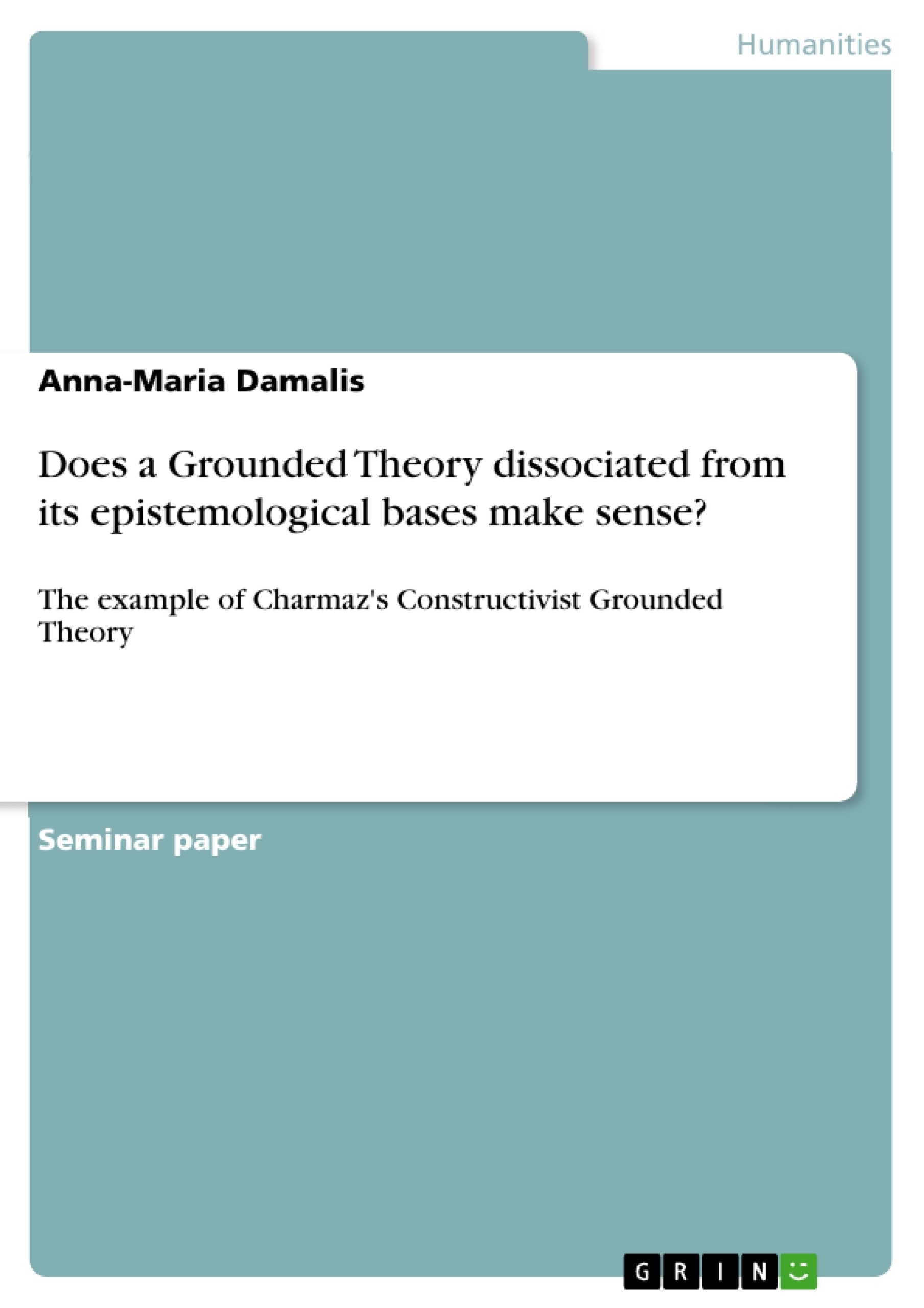I. Introduction
Since the first publication of Grounded Theory (in the following GT) by Anselm L. Strauss and Barney Glaser in 1967, a lot of scientists and researchers have written about, applied and reformulated this theory-building method. What is lacking in many of these works is GT’s acknowledgement as a methodology. Many researchers have applied the procedures proposed by Strauss and Glaser, but they do not seem to be aware of the epistemological implications resulting from the use of the GT method. As Strauss together with his co-author Juliet Corbin stated:
“In this book (Basics of Qualitative Research, BD/CL), we are offering more than a set of procedures. We are offering a way of thinking about and of viewing the world that can enrich the research of those who choose to use this methodology.” (Strauss/ Corbin 1998: 4)
Kathy Charmaz appears to be an exception in this canon, since she is not only thinking about the philosophy of knowledge behind GT, but also attempting to renew the epistemological groundings of GT in the field of constructivism. This leads us to the main question of this thesis: Is this possible? Can the GT method be abstracted from the epistemology standing behind it and be founded on a new one? An affirmative answer would mean that GT from the beginning was simply a method and could be used by all researchers, no matter which tradition they belong to or which theoretical approach they pursue. Or as Charmaz put it: “…researchers starting from other vantage points – feminist, Marxist, phenomenologist – can use grounded theory strategies for their empirical studies.” (Charmaz 2000: 511) The negation of the question would imply that Charmaz’s constructivist approach cannot claim the term Grounded Theory for itself.
The following paper will examine this question in greater detail in order to find a tentative answer. Starting with a short description of the development, procedures and epistemological foundations of GT , the second part will focus on Charmaz’s arguments brought forward against the variant of Strauss and her constructivist version of GT. At the end of this section, her propsals will be evaluated in terms of innovation. In a third section her arguments against Strauss & Corbin will be examined regarding their warrant and validity. Finally, the conclusion will draw together all arguments to solve the question about the exchangeability of the epistemological fundament of GT.
Inhaltsverzeichnis (Table of Contents)
- I. Introduction
- II. What is GT and what are its epistemological groundings?
- II.1. Strauss and Corbin's Systematic Design
- II.2. Glaser's Emerging Design
- II.3. The epistemological foundations of Strauss's and Corbin's Grounded Theory
- III. Charmaz's constructivist Grounded Theory
- III.1 Critique on Strauss & Corbin
- III.2 Constructivist "Grounded Theory"
- III.3 What is really new about Charmaz's approach?
- III.4. How justified are Charmaz's arguments against Strauss & Corbin?
- IV. Conclusion
Zielsetzung und Themenschwerpunkte (Objectives and Key Themes)
This paper aims to examine the potential of applying constructivist principles to the methodology of Grounded Theory (GT). It investigates whether GT, as a method, can be separated from its original epistemological foundations and re-grounded in constructivism. The paper analyzes the development, procedures, and epistemological foundations of GT, with a particular focus on the constructivist version of GT proposed by Kathy Charmaz. It further evaluates the innovations and justifications of Charmaz's approach in relation to the traditional GT method developed by Strauss and Corbin.
- The evolution and development of Grounded Theory
- The epistemological foundations of Grounded Theory
- The relationship between methodology and epistemology
- Charmaz's constructivist approach to Grounded Theory
- The implications and justifications of a constructivist Grounded Theory
Zusammenfassung der Kapitel (Chapter Summaries)
The paper begins by defining Grounded Theory as a methodology for deriving theories from observational data. It introduces the two main branches of GT, represented by the approaches of Strauss and Corbin, and Glaser, highlighting their differences in terms of systematic design and flexibility. The discussion then focuses on the epistemological underpinnings of Strauss and Corbin's version of GT, outlining its core principles and assumptions. The second chapter delves into Charmaz's constructivist Grounded Theory, examining her critiques of Strauss and Corbin's approach and exploring her proposed alternative. It also examines the novelty and potential implications of Charmaz's constructivist approach. The paper concludes by evaluating the validity and warrant of Charmaz's arguments against Strauss and Corbin, ultimately addressing the key question of whether GT can be divorced from its original epistemological grounding and re-grounded in constructivism.
Schlüsselwörter (Keywords)
Grounded Theory, constructivism, epistemology, methodology, qualitative research, Strauss & Corbin, Glaser, Charmaz, systematic design, emergent design, theory building, data analysis, research methods.
Frequently Asked Questions
What is the central question of this thesis?
The thesis explores whether the Grounded Theory (GT) method can be abstracted from its original epistemological foundations and be founded on a new one, specifically constructivism.
Who are the original founders of Grounded Theory?
Grounded Theory was first published by Anselm L. Strauss and Barney Glaser in 1967.
What is Kathy Charmaz's role in the development of GT?
Kathy Charmaz is a key figure who attempted to renew the epistemological groundings of GT by introducing a constructivist approach to the methodology.
What is the difference between Strauss/Corbin and Glaser's designs?
The paper distinguishes between Strauss and Corbin's "Systematic Design" and Glaser's "Emerging Design" in terms of their procedures and flexibility.
Why is the acknowledgement of GT as a methodology important?
The author argues that GT is more than just a set of procedures; it is a way of thinking about the world that carries specific epistemological implications.
- Quote paper
- Anna-Maria Damalis (Author), 2007, Does a Grounded Theory dissociated from its epistemological bases make sense?, Munich, GRIN Verlag, https://www.hausarbeiten.de/document/191796


